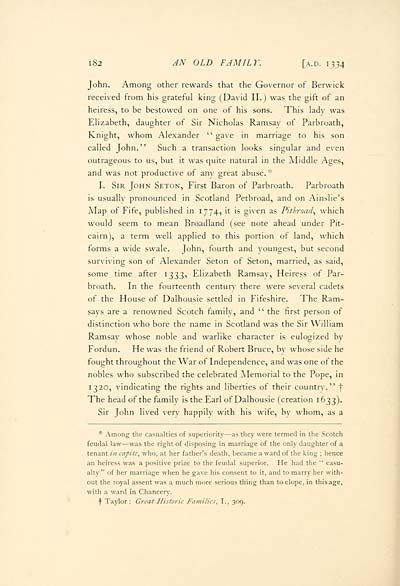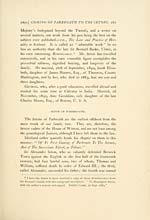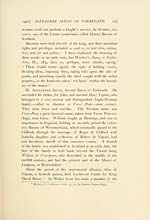Old family; or, The Setons of Scotland and America
(218) Page 182
Download files
Complete book:
Individual page:
Thumbnail gallery: Grid view | List view

1 82 AN OLD FAMILY. [a.d. 1354
John. Among other rewards that the Governor of Berwick
received from his grateful king (David II.) was the gift of an
heiress, to be bestowed on one of his sons. This ladv was
Elizabeth, daughter of Sir Nicholas Ramsay of Parbroath,
Knight, whom Alexander "gave in marriage to his son
called John." Such a transaction looks singular and even
outrageous to us, but it was quite natural in the Middle Ages,
and was not productive of anv great abuse. *
I. Sir John Seton, First Baron of Parbroath. Parbroath
is usually pronounced in Scotland Petbroad, and on Ainslie's
Map of Fife, published in 1774, it is given as Pitbroad, which
would seem to mean Broadland (see note ahead under Pit-
cairn), a term well applied to this portion of land, which
forms a wide swale. John, fourth and youngest, but second
surviving son of Alexander Seton of Seton, married, as said,
some time after 1333, Elizabeth Ramsay, Heiress of Par-
broath. In the fourteenth century there were several cadets
of the House of Dalhousie settled in Fifeshire. The Ram-
savs are a renowned Scotch family, and " the first person of
distinction who bore the name in Scotland was the Sir William
Ramsav whose noble and warlike character is eulogized by
Fordun. He was the friend of Robert Bruce, by whose side he
fought throughout the War of Independence, and was one of the
nobles who subscribed the celebrated Memorial to the Pope, in
1320, vindicating the rights and liberties of their countrv." f
The head of the family is the Earl of Dalhousie (creation 1633).
Sir John lived very happily with his wife, by whom, as a
* Among the casualties of superiority — as they were termed in the Scotch
feudal law — was the right of disposing in marriage of the only daughter of a
tenant in capite, who, at her father's death, became a ward of the king ; hence
an heiress was a positive prize to the feudal superior. He had the " casu-
alty" of her marriage when he gave his consent to it, and to marry her with-
out the royal assent was a much more serious thing than to elope, in this age,
with a ward in Chancery.
f Taylor : Great Historic Families, I., 309.
John. Among other rewards that the Governor of Berwick
received from his grateful king (David II.) was the gift of an
heiress, to be bestowed on one of his sons. This ladv was
Elizabeth, daughter of Sir Nicholas Ramsay of Parbroath,
Knight, whom Alexander "gave in marriage to his son
called John." Such a transaction looks singular and even
outrageous to us, but it was quite natural in the Middle Ages,
and was not productive of anv great abuse. *
I. Sir John Seton, First Baron of Parbroath. Parbroath
is usually pronounced in Scotland Petbroad, and on Ainslie's
Map of Fife, published in 1774, it is given as Pitbroad, which
would seem to mean Broadland (see note ahead under Pit-
cairn), a term well applied to this portion of land, which
forms a wide swale. John, fourth and youngest, but second
surviving son of Alexander Seton of Seton, married, as said,
some time after 1333, Elizabeth Ramsay, Heiress of Par-
broath. In the fourteenth century there were several cadets
of the House of Dalhousie settled in Fifeshire. The Ram-
savs are a renowned Scotch family, and " the first person of
distinction who bore the name in Scotland was the Sir William
Ramsav whose noble and warlike character is eulogized by
Fordun. He was the friend of Robert Bruce, by whose side he
fought throughout the War of Independence, and was one of the
nobles who subscribed the celebrated Memorial to the Pope, in
1320, vindicating the rights and liberties of their countrv." f
The head of the family is the Earl of Dalhousie (creation 1633).
Sir John lived very happily with his wife, by whom, as a
* Among the casualties of superiority — as they were termed in the Scotch
feudal law — was the right of disposing in marriage of the only daughter of a
tenant in capite, who, at her father's death, became a ward of the king ; hence
an heiress was a positive prize to the feudal superior. He had the " casu-
alty" of her marriage when he gave his consent to it, and to marry her with-
out the royal assent was a much more serious thing than to elope, in this age,
with a ward in Chancery.
f Taylor : Great Historic Families, I., 309.
Set display mode to:
![]() Universal Viewer |
Universal Viewer | ![]() Mirador |
Large image | Transcription
Mirador |
Large image | Transcription
Images and transcriptions on this page, including medium image downloads, may be used under the Creative Commons Attribution 4.0 International Licence unless otherwise stated. ![]()
| Histories of Scottish families > Old family; or, The Setons of Scotland and America > (218) Page 182 |
|---|
| Permanent URL | https://digital.nls.uk/95732535 |
|---|
| Description | A selection of almost 400 printed items relating to the history of Scottish families, mostly dating from the 19th and early 20th centuries. Includes memoirs, genealogies and clan histories, with a few produced by emigrant families. The earliest family history goes back to AD 916. |
|---|

